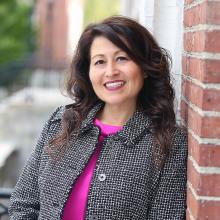Member Spotlight: Adriana J. Umaña-Taylor, Ph.D.
Sara Lawrence-Lightfoot Professor of Education at Harvard University; Member of the SRCD Latinx Caucus.
Why did you decide to choose Developmental Science as a course of study or career?
I think I chose Developmental Science as a career because I am fascinated by the human capacity for change. I also find that I have a hard time thinking about any psychological phenomenon without wondering about developmental contingencies. It is simply the way I think about and understand the world. Change is perhaps one of the only things we can always count on...and Developmental Science helps me understand how to make sense of change (and how to study it using really interesting methods).
Do you have a mentor or mentors who have been instrumental to your career and, if so, who and how?
Mentors have been such an important part of my professional and personal journey! I would not be where I am today if not for the generous support, guidance, love, and advice of many mentors. Some of the mentors who played a crucial role in my career were formal mentors, such as my Ph.D. advisor (Dr. Mark Fine), and a tenured faculty colleague (Dr. Jasna Jovanovic) who was formally assigned as my faculty mentor when I began my career as an Assistant Professor at the University of Illinois at Urbana-Champaign. I was so fortunate to learn from and with these amazing humans about conducting excellent scholarship, contributing to the profession through teaching and service, mentoring students, and navigating the academy. However, I have also had many informal, but critically important mentors – folks who I was fortunate enough to take a class with, have on my Ph.D. committee, or simply develop relationships with through informal gatherings at conferences or through research collaborations – many of these individuals are people of color, and their support and advice has been critical for helping me navigate my career as a Latina, a first-generation college student, a daughter of immigrants, and a parent – social identities that are not always compatible with academia. I am especially grateful for Dr. Helen Neville who took me under her wing while I was a graduate student and has guided and supported me throughout my entire career – through the good and the bad – among many things, she has taught me the importance of self-care, compassion, resistance, and healing. Most importantly, all of my mentors (formal and informal) have served as excellent role models to help me better understand how I can support and nurture the next generation of scholars – and for this, I am eternally grateful.
What advice would you give to a Graduate student beginning their Ph.D. studies in Developmental Science or related?
Always follow your passion and don't be afraid to change course. It's never too late to change your focus. It's OK to change your mind - it's not OK to be stuck studying something or working toward a goal that you are not very interested in - we work too hard to not love what we're doing - So, permit yourself to change course. It will be hard in the moment, you will probably make some people unhappy, but you will be happier (and probably much more successful and good at what you end up doing) in the long term.
What is your best SRCD memory?
My best SRCD memory has to be the "Constructing the Other" special themed conference in Puerto Rico in 2022. We were just returning to in-person gatherings in the Spring of 2022 after COVID, and this meeting was incredible! It was soul-filling - to be surrounded by so many wonderful scholars, so many folks who are passionate about issues of social justice and equity, so many folks doing excellent and inspiring work, and to have this all take place in a Spanish-speaking community, with a beautiful beach as the backdrop, amazing food, and such warm and welcoming people - it was magical.
How do you relax when you are not teaching or conducting research?
My ideal way to relax is being on or near a beach, listening to the waves crash on the shore, and reading a book.
